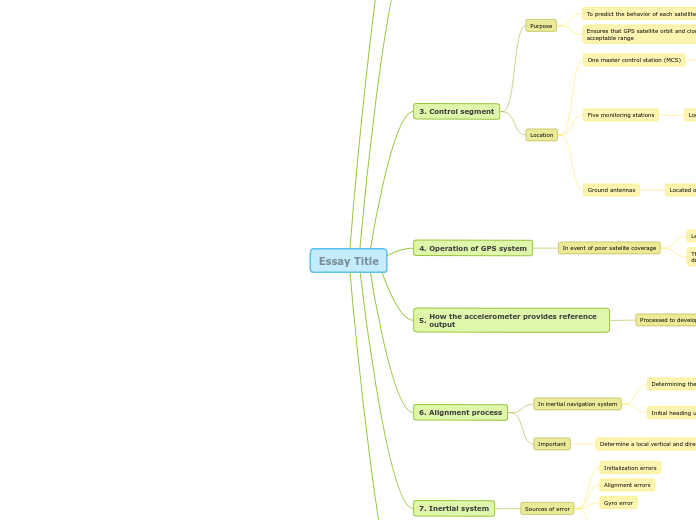Essay Title
Satellite
Two-dimensional & three dimensional
Latitude
Longitude
Altitude
FOUR satellites need to be in view to access the datas
Differences
Ephemerus data
Very precise
orbital
Clock correction for each SV
Necessary for
precise positioning
Almanac data
Not very precise
Considered valid for up to several months
Control segment
Purpose
To predict the behavior of each satellite orbit and clock
Ensures that GPS satellite orbit and clock remain within acceptable range
Location
One master control station (MCS)
Located at Schriever in Colorado Springs, USA
Five monitoring stations
Located in
Colorado Springs
Hawaii
Kwajalein
Diego Garcia
Ascension Island
Ground antennas
Located on
Ascension Island
Diego Garcia
Kwajalein
Operation of GPS system
In event of poor satelite coverage
Less than 30 seconds
The system uses other navigation sensor inputs to enter into a dead reckoning mode
How the accelerometer provides reference output
Processed to develop navigation data
Calculate velocity and distance information
Only one direction
Two accelerometer
Mount together with right angles
Measure acceleration
Give out data velocity and distance in any lateral direction
Example
Two accelerometer and directed to N-S or W-E
Alignment process
In inertial navigation system
Determining the local vertical
Initial heading using
Accelerometer
Laser gyro
Important
Determine a local vertical and direction of true north
Inertial system
Sources of error
Initialization errors
Alignment errors
Gyro error
How these error can be overcome?
If one system’s position differs from the other two by a predetermined amount the crew can be alerted to this
They might decide to deselect the system
Inertial reference system
Advantages
Lower cost
Reduced size
Greater reliability
Operates at all the altitudes
Disadvantages
An increase in computing complexity
Vibration and thermal variation may cause flaws in information data
INS is an expensive technology
Time information cannot be given
